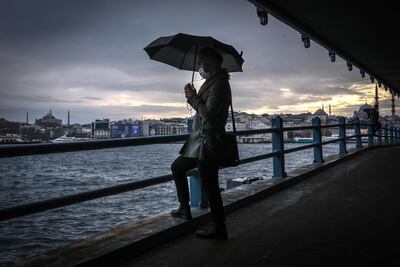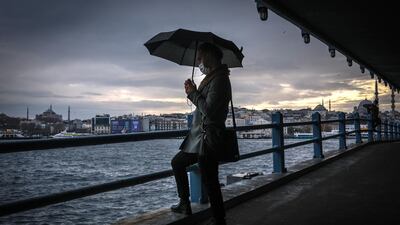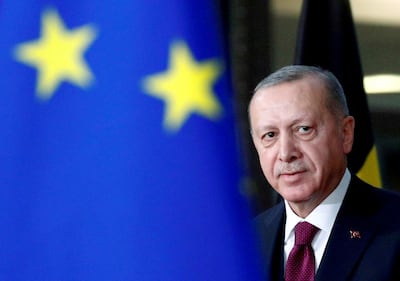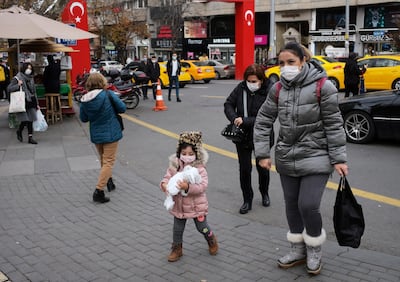Keep your seat belts buckled, Turkey watchers – 2021 is likely to be just as turbulent as the year that just passed.
Developments in the last days of 2020 point towards continued rising tensions as an anxious President Recep Tayyip Erdogan seeks to shore up sagging support within an increasingly frustrated populace.
Let's begin with the spike in femicides. On a single day last week, at least four women were killed by men in Turkey. The most high-profile was 48-year-old Aylin Sozer, head of Aydin University's preschool education department, who was killed at her residence on Istanbul's Asian side.
The hashtag #ArtikYeter (“Enough Already”) lit up Turkish Twitter, with many calling for Mr Erdogan and his Justice and Development Party-led (AKP) government to take action, enforce laws and punish the perpetrators.
"In the last year in our country, 386 women have been slaughtered," Meral Aksener, head of the opposition nationalist Good Party, wrote in a January 1 tweet addressed to Mr Erdogan. "In order to go out and shamelessly insult women, go do your duty first, ensure the safety of women."
Due to Covid-19 lockdowns, domestic abuse in Turkey had already risen as much as a third, drawing greater attention to the issue. Under the AKP, laws against violence on women have often been weakly enforced, with critics blaming this on the party's dogmatic views.
Former Deputy Prime Minister Bulent Arinc has said women should not laugh loudly in public, while AKP lobbyists have argued that the world’s leading anti-women’s violence initiative, the Istanbul Convention, is an attack on the family. Mr Erdogan has explicitly said men and women are not equal and called on women to have at least three children.
Last week his wife sought to address widespread fears that the most recent perpetrators would not face justice. "Every femicide opens new wounds in our hearts," first lady Emine Erdogan said in a tweet. "We expect the criminals who murdered our women to receive the heaviest punishment.
Next, a week ago Turkey's parliament passed a law authorising the government to halt the activities and remove the officials of any non-governmental organisation under investigation for terrorism activities. Countless people and organisations in Turkey have faced terrorism charges since the July 2016 failed coup.

Leading NGOs, including Amnesty International, condemned the law. "Given that thousands of civil society activists, journalists, politicians, and members of professional organisations are investigated within the scope of [antiterrorism law], there is no doubt that this law will target almost all opponent associations," they said.
The next day, Turkey's top court ruled that the three-year detention of Osman Kavala, one of the country's top philanthropists, who has not been convicted of any crime, did not violate his rights. The European Court of Human Rights has repeatedly urged Ankara to release him.
Finally, on the last weekend of 2020, independent news outlet Olay TV shut down just 26 days after its launch, succumbing to government pressure to stop covering Turkey’s main pro-Kurdish party. “It becomes the shortest broadcast in Turkish television history,” anchor Nevsin Mengu said as Olay signed off, live on the air. “Let it be, it's a record for history.”
This came a few days after exiled Turkish journalist Can Dundar was sentenced to 27 years in prison for doing his job. In 2015 Mr Dundar's Cumhuriyet newspaper published photos of trucks ferrying Turkish arms shipments to rebel groups in Syria, drawing Mr Erdogan's wrath and accusations of treason. Also last month, the Turkish government forced YouTube to shut down the page of Bold Medya, a video news outlet run by several Turkish journalists, like Mr Dundar, living in exile in Germany.
The driving force behind these moves is falling AKP support, mainly due to the ravaged Turkish economy. The Turkish lira fell 30 per cent against the US dollar last year amid high inflation, high unemployment and fast-growing debt. In addition, the AKP may be starting to fracture after two former top AKP figures, economic czar Ali Babacan and foreign minister Ahmet Davutoglu, departed to launch opposition parties and as many as a million long-time members left the party. Mr Babacan, who rekindles positive memories for many due to his oversight of Turkey's economic rise, is said to have made a strong impression with his tour of the country in recent weeks
Mr Erdogan and the AKP – which has never lost a vote in its 20-year history – face unprecedented headwinds in Turkey’s next election, which is currently scheduled for 2023 but could come sooner. “His chances of being re-elected are less than 50 per cent,” Asli Aydintasbas, a fellow at the European Council on Foreign Relations, warned last week.
On the last day of 2020, Turkey’s leader again promised that his government would improve its performance in the near future. “We are in the process of preparing reforms that will strengthen our economy and raise the standard of our democracy, rights and freedoms,” Mr Erdogan said in a speech posted on the Turkish presidency website.
Yet one of the president’s first acts of 2021 was to issue a decree appointing Melih Bulu rector of Turkey’s top institution of higher learning, Istanbul’s prestigious Bogazici University. Mr Bulu has never served in an academic administrative position, having previously run for office four times for the ruling AKP.
Within hours of his appointment, Turkish Twitter exploded with the news that he had plagiarised several peer-reviewed journal articles and the vast majority of his doctoral thesis. “Entire paragraphs of this Melih Bulu paper are straight up lifted from an article written by others,” political analyst Can Okar tweeted. “The Rector of a top university can’t have this on their record.”
A government failing to protect its women, silencing critical voices at home and abroad, promoting liars and cheats, detaining do-gooders who have committed no crime and eviscerating groups that aim to improve citizens’ lives seems much more likely to increase anger and frustration than curb it.
Add to all this last month's surge in coronavirus cases and new restrictions, the recently levied sanctions by the US and the looming threat of harsh sanctions from the European Union, which could further destabilise the economy, and one can appreciate how Mr Erdogan might see himself in the crosshairs.
"Turkey will surely get what it deserves politically and economically in the new global architecture,” he said last week.
This may be the year we finally find out what Mr Erdogan’s Turkey deserves, and it could get ugly.
David Lepeska is a Turkish and Eastern Mediterranean affairs columnist for The National




